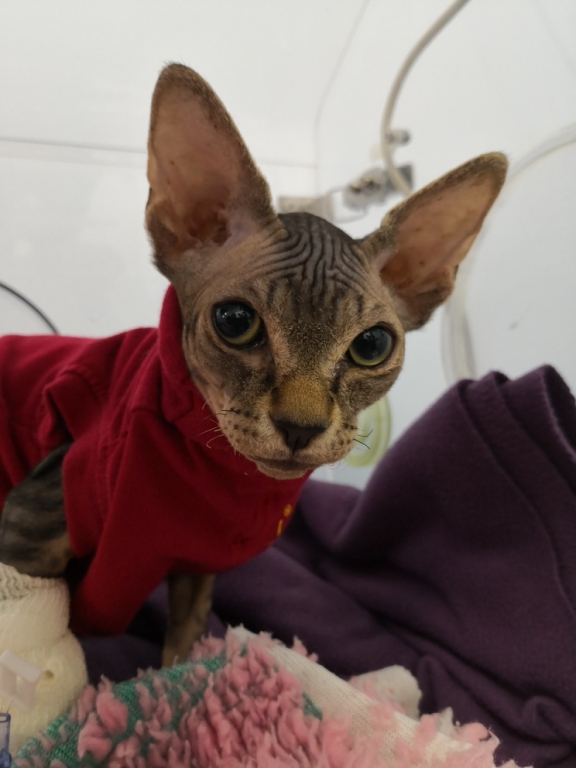
Pro Bono Kidney Surgery Saves Sphynx Kitten
A 12-week-old kitten who underwent pro bono surgery at Davies Veterinary Specialists (Davies) in Hertfordshire to remove an abnormal, grossly enlarged kidney now has a bright future.
Keril’s breeder was worried about the kitten’s increasingly swollen abdomen, and reluctantly thought it would be best to have him put to sleep. He was an otherwise normal, lively kitten, and a local cat lover insisted on taking responsibility of ownership to give him a chance.
The kitten’s primary care practice appealed to Davies for pro bono treatment and Keril fulfilled the criteria of being likely to achieve a full recovery following specialist care, but was otherwise precluded from referral because of the owners’ particular circumstances.
Anna Threlfall, Specialist in small animal medicine at Davies, could feel a large abdominal mass occupying the majority of Keril’s abdomen. An ultrasound scan revealed severe right sided hydronephrosis and right hydroureter. The ureteral papilla was not clearly identified on the right, which suggested an ectopic ureter. The left kidney appeared normal, although it was compressed by the very large right kidney. Bloods and a urine sample confirmed that the left kidney was functioning adequately, and that there was no concurrent urinary tract infection.
Keril needed surgery to identify the extent of his problem so Anna referred the kitten to her colleague Dr Carolyn Burton, a Specialist in small animal surgery at Davies. A ventral midline laparotomy revealed a very large, hydronephrotic right kidney. The caudal vena cava was adhered to the ventral aspect of the right kidney, which Dr Burton carefully dissected from the outer capsule. The right ureter was severely dilated and circumcaval; it bypassed the bladder and extended caudally into the pelvis so was excised cranial to the pelvic brim in order to minimise trauma.
Dissection of the abdominal structures was particularly challenging because of Keril’s extremely thin tissue but the surgery went smoothly.
“Keril recovered from surgery as if nothing had happened and he was discharged within 48 hours,” said Dr Burton. “The owner reports he is back to his cheeky self and is growing well. The prognosis is excellent and we look forward to hearing updates as he grows up.”
Davies sees an average of one case per month under their pro bono scheme. All requests need to be submitted by the primary care vets and each case is assessed on their individual merits.
To find out more about Davies visit: https://vetspecialists.co.uk/
More from Davies Veterinary Specialists

 6 years ago
6 years ago  2531 views
2531 views
